Is the Netherlands becoming a narco-state?
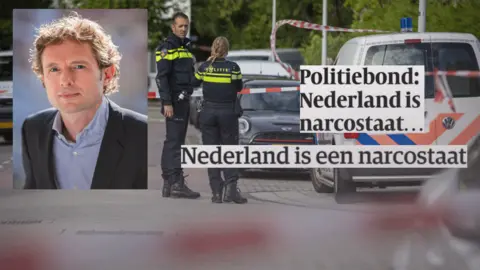 Ilya van Marle/De Beeldunie/Getty Images
Ilya van Marle/De Beeldunie/Getty Images"We definitely have the characteristics of a narco-state," confides Jan Struijs, chairman of the biggest Dutch police union.
"Sure we're not Mexico. We don't have 14,400 murders. But if you look at the infrastructure, the big money earned by organised crime, the parallel economy. Yes, we have a narco-state."
His words echo in a society that has been convulsed by a murder that went far beyond the bubble of the criminal underworld.
The deadly shooting of Derk Wiersum destroyed a common misconception here: that drug cartels only kill their own. A 44-year-old father of two, he was shot dead in front of his wife outside their home in Amsterdam in September.
'This is meant to frighten us'
Wiersum was the lawyer for a crown prosecution witness, Nabil B, who had turned supergrass in a case against two of the Netherlands' most wanted suspects.
The shooting in broad daylight in quiet suburbia was seen as an attack on civil society, democracy and the rule of law.
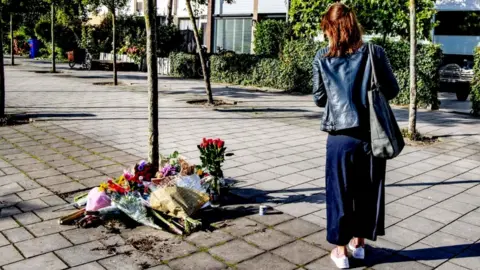 Getty Images
Getty Images"This is meant to frighten us," warned public prosecutor Fred Westerbeke. "We must continue to use key witnesses otherwise we will get no further."
Suddenly, the fears of a drug users' paradise turning into a haven for drug crime and an economy undermined by it had burst into the open.
"A few incidents over the last few years were like a sign on the wall," explains Wouter Laumans whose bestseller, Mocro Mafia, is a story charting the rise of a new generation of criminals in Amsterdam.
"The signs were there that it could flow over from the underworld to the upper world, and now that has happened."
Laumans lists a series of incidents as evidence of the escalating brutality:
- Two young boys killed in Kalashnikov shootout with bullets ricocheting off walls
- A mother murdered in front of her children
- A severed head outside a coffee shop
- The murder of a crown witness's brother, Reduan B
- The murder of lawyer Derk Wiersum
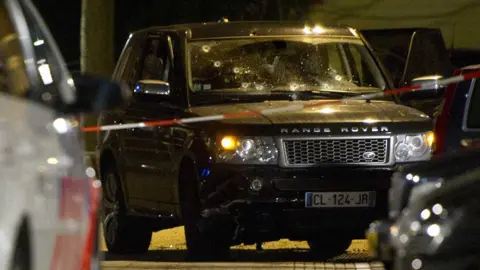 EPA
EPA
What is the 'Mocro Mafia'?
"It's street slang. Young Moroccans call each other 'Mocro'," says Laumans, who wrote the book with Marijn Schrijver.
"We came up with Mocro Mafia to encapsulate what the book was about. Now I see they're using it in police reports. But it's not only Moroccans. It's about young boys growing up in areas of Amsterdam where tourists never go.
"It's not canals, the Rijksmuseum, Van Gogh. It's the housing estates. They don't have the same opportunities. They are aspirational, they are looking for a career in the underworld."

Organised crime 'rotting society'
Even before Wiersum's murder, a report commissioned by the mayor of Amsterdam in August described the capital as a "Valhalla for drugs criminals".
The Netherlands wasn't yet a narco-state but was in danger of becoming one, warned Justice Minister Ferd Grapperhaus.
Without firm intervention, he said, "you'll get a minister standing here in dark glasses, rather that someone simply giving democratic accountability".
"We knew it was coming," Jan Struijs told me. "Lawyers, mayors, police officers - we've all been threatened by organised crime. All the alarms have been sounding but the politicians have been naive. Now it's rotting the concrete of our society."
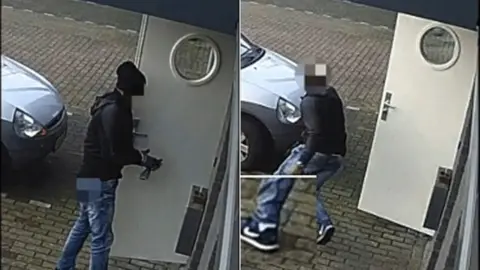 Dutch police
Dutch policeA few days later another Dutch lawyer, Philippe Schol, was shot in the leg in a drive-by shooting, while out walking his dog near his home across the border in Germany.
One opinion poll suggested 59% of people believed the Netherlands was now a narco-state, in other words a country whose economy is dependent on the trade in illegal drugs.
It strikes me as ironic that in a bureaucratic nation that sends you a dog tax reminder or fine for an overdue parking payment in a flash, gangsters remain at large and gangland shootings erupt on a regular basis.

Arrest of the Netherlands' most wanted
Then came a high-profile arrest in the Gulf this week.
Ridouan Taghi was detained entering Dubai on a fake ID and held under an international arrest warrant on suspicion of multiple murders and drug running.
Described by police as one of the world's "most dangerous men", the 41-year-old is suspected of ordering a string of "liquidations", including the murder of Derk Wiersum.
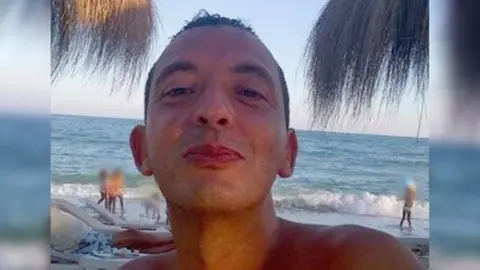 Dutch police
Dutch policeDutch prosecutors immediately sought his extradition, ahead of a major gangland trial in March 2020, and he was flown to the Netherlands late on Wednesday.
The "Marengo" case involves five murders and a series of attempted murders, including the brother of informant Nabil B.
Ridouan Taghi is believed to have been living in Dubai with his wife and six children.
Dutch police say his arrest followed intense international co-operation rather than a tip-off . A hundred detectives were involved and police chief Erik Akerboom said the arrest was "of great importance to the Netherlands".
Read more from Anna: Astrid Holleeder's story: Why I betrayed my crime boss brother
"Taghi and his henchmen pose a threat to the rule of law. It is very important for us as police... to remove threats," he said.
The following day, six people were picked up across the Netherlands on suspicion of money laundering and possessing drugs and firearms.
While the arrest of Ridouan Taghi was a success for Dutch law enforcement, Wouter Laumans doubts it'll deter young people from aspiring to follow in his footsteps.
"It's about opportunities in society. They're no different from bankers or journalists, they want to make money. If you aren't a good football player or don't have the brains to wrestle yourself out of that world, this is their means. It's not just a drug problem, it's a social problem."

How big is the Dutch drug problem?
The Netherlands has in a sense created the perfect environment for the drugs trade to flourish.
With its extensive transport network, its lenient drug laws and penalties, and its proximity to a number of lucrative markets, it is an obvious hub for the global narcotics flow.
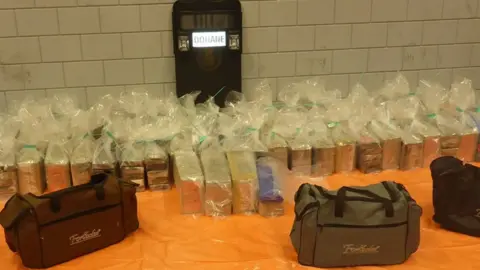 Dutch public prosecutor
Dutch public prosecutorRenowned writer Roberto Saviano, who chronicled the organised crime world of the Naples Camorra network, believes mafia influence in Amsterdam is even worse.
"There are clans from all over the world, because the Netherlands is one of the most important transit ports. They know whoever controls the Netherlands has one of the arteries of the global drug market," he told the Volkskrant newspaper.
Billions and billions of euros are earned on the black market. Synthetic drugs with a street value of €18.9bn (£16bn; $22bn) were produced in the Netherlands in 2017.
Soft drugs have been imported from Colombia and North Africa for 30 years. Today a significant portion of synthetic drugs - MDMA, LSD, amphetamines, GHB and crystal meth - are produced in the Netherlands. In fact the country is considered a world leader.
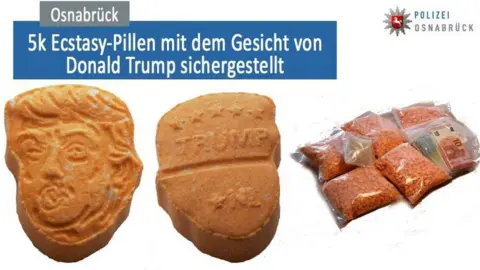 Osnabrück Police
Osnabrück PolicePolice union chief Jan Struijs highlights the speed at which these drugs are transported around the globe.
"On the day Donald Trump became president, the first distinctive orange 'Trumpies' ecstasy tablets were found in Schiphol; 24 hours later they were on sale in Australia.
"There are a lot of Mexicans helping to produce crystal meth in the Netherlands. You see a cocaine dump in Venezuela and Suriname, you see very low prices in Amsterdam, Liverpool and Manchester. Every gram you buy goes to organised crime and to funding these drug cartels."

Where the Netherlands fits on the drugs map
South American drug lords started by shipping to West Africa. The drugs then went north over old smuggling lines from Morocco, and young Moroccans whose parents had moved to the Netherlands still had family connections and migration routes to tap into.
That is how police allege Ridouan Taghi made his fortune. He inherited or "gained control" of a smuggling line and started moving cocaine instead of cannabis - which generated more money, and violence.
While ringleaders often operate internationally, police fear they are able to use domestic influence to control contract killers who are becoming increasingly younger.
"Police understand but don't have the means to intervene," shrugs Jan Struijs, "It's not only the budget cuts. Also youth prevention teams have gone. So young people are falling under the radar. Then suddenly we see them helping with liquidations."
But does that mean that the Netherlands has turned into a narco-state?
"We don't have bodies dangling from bridges," argues Wouter Laumans, "but we do have corruption in the docks, violence against lawyers, threats to journalists. It definitely has some of the characteristics of a narco-state lite."
If it does have such an unenviable status, it manifests itself mostly below the radar.
The Dutch economy may not be dependent or defined by the drugs industry, but that industry is exerting increasing influence on society.

